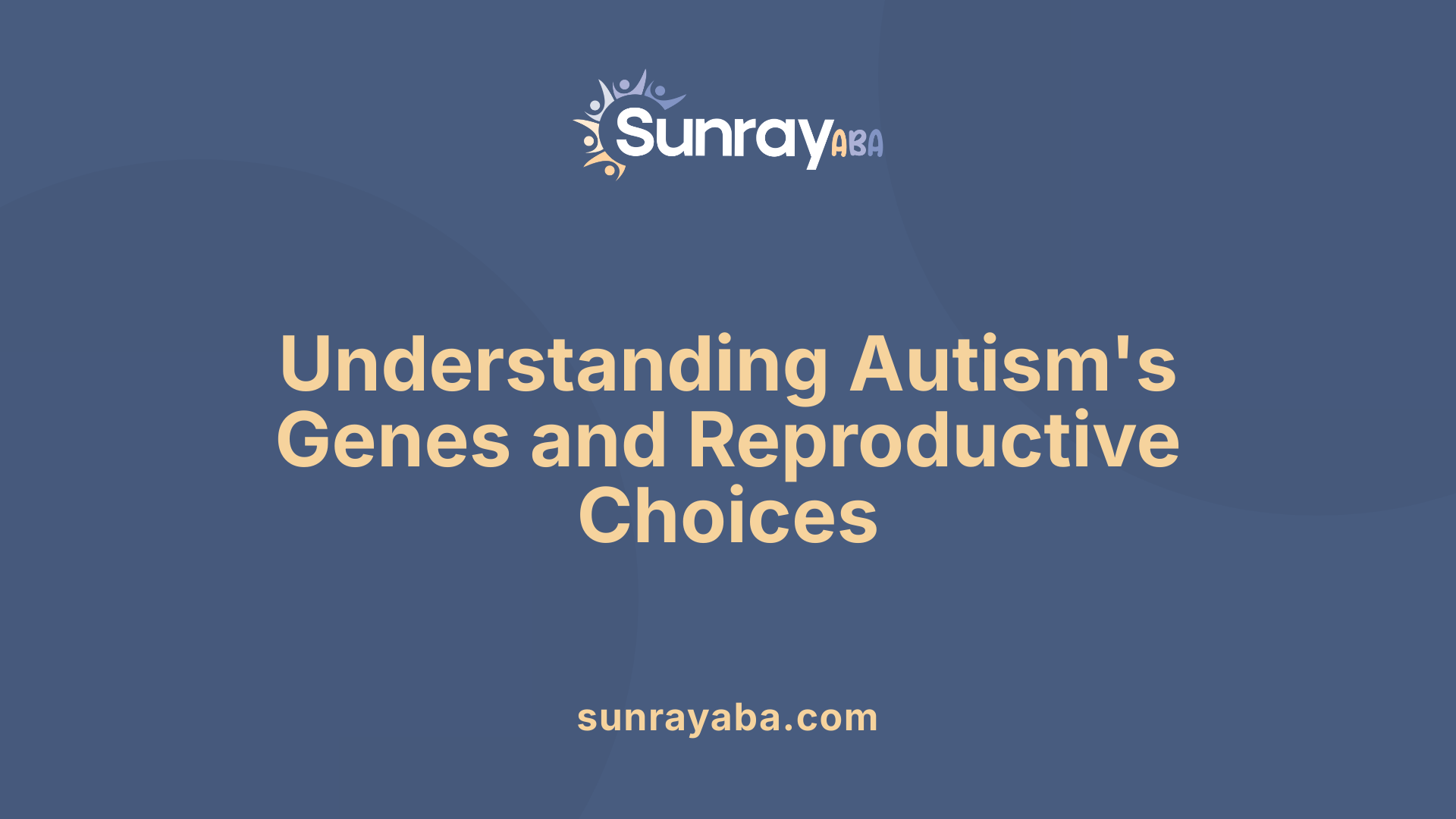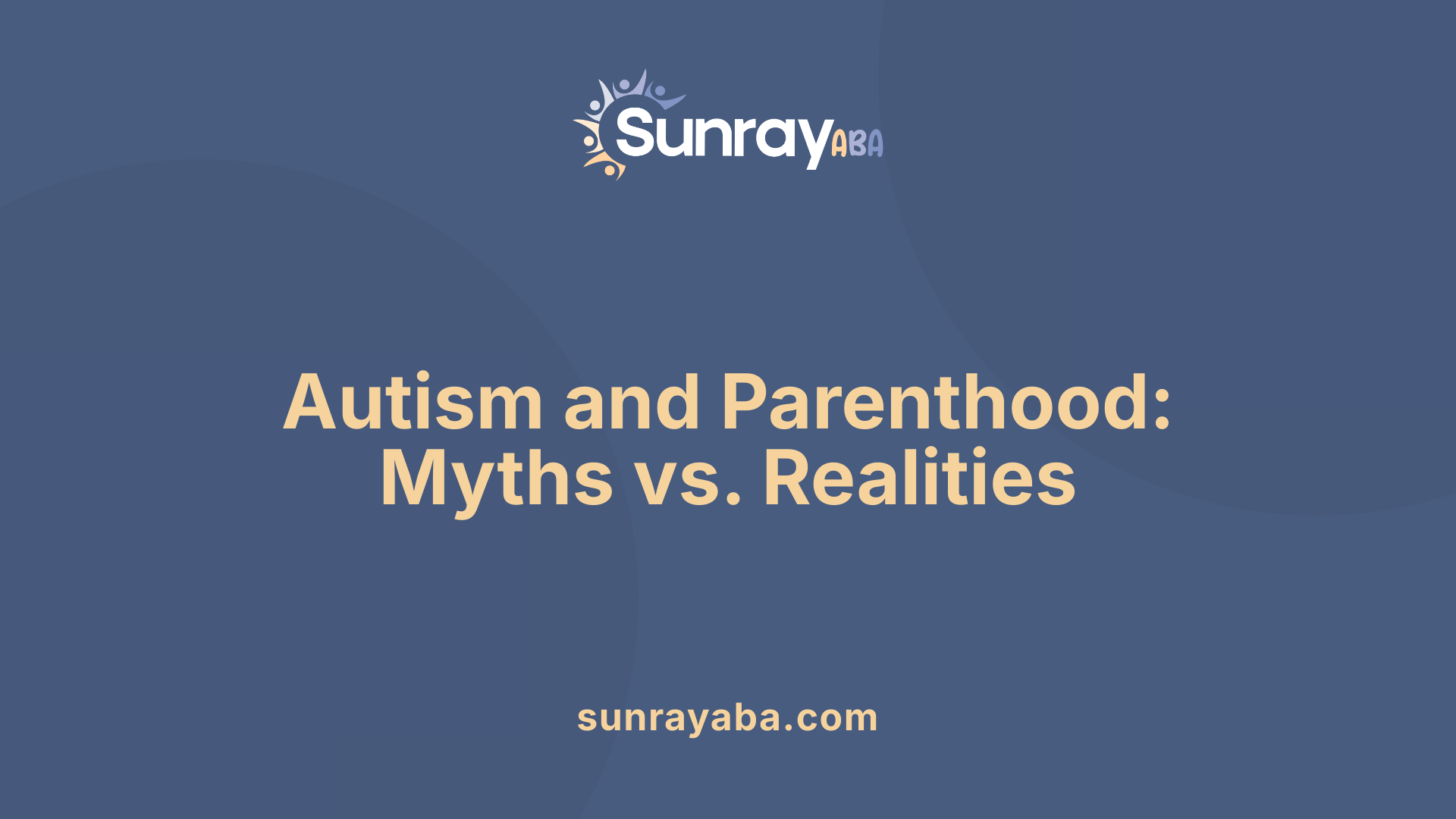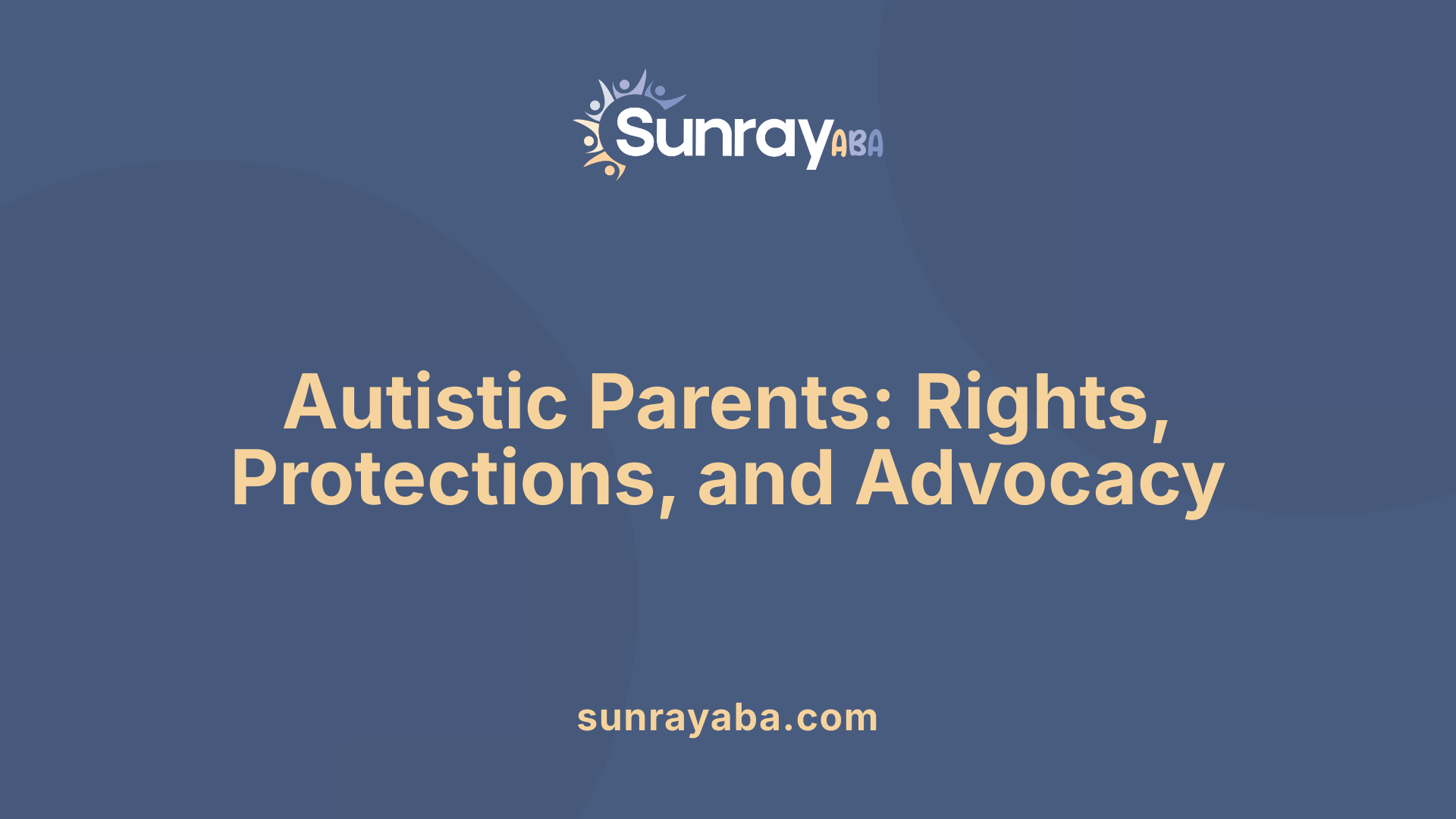Can Autistic People Have Kids?

Exploring Parenthood at the Intersection of Autism and Genetics
The question of whether autistic individuals can have children touches on many intertwined issues—biological, societal, and personal. As awareness grows, so does understanding that autism does not inherently prevent parenthood. This article examines the scientific, legal, and social facets of autism and reproduction, empowering autistic individuals and their families to navigate this complex landscape with confidence and support.
Genetic Foundations of Autism and Reproduction

What are the biological and genetic factors associated with autism, and how do they affect reproductive choices?
Autism Spectrum Disorder (ASD) is largely influenced by genetic factors, with studies estimating heritability between 40% and 90%. This high genetic component involves hundreds of genes that play roles in neural development, synapse formation, and how brain regions connect. These genes can be inherited from parents or may undergo spontaneous mutations, known as de novo mutations, that occur in the affected child without being present in the parents.
De novo mutations are particularly significant, accounting for up to half of all autism cases with only one affected child in the family. Such mutations can alter critical genes involved in brain development, sometimes with profound effects on gene function, especially when a gene requires two functioning copies. This genetic variability makes autism risk complex.
Environmental factors also influence autism risk but are generally considered secondary to genetic influences. Factors like parental age, prenatal exposure to pollutants, and maternal health conditions can modify genetic susceptibility but do not directly cause autism.
Understanding the genetic underpinnings allows prospective parents to better assess the likelihood of autism recurring in future children through genetic testing and counseling. Identifying specific risk genes or mutations enables informed reproductive decisions, including choices about prenatal testing or assisted reproductive technologies.
In summary, autism is a highly heritable condition with complex genetic influences. Recognizing these factors not only aids in understanding autism's biological roots but also informs reproductive options, permitting families to plan and prepare effectively.
Can Autistic People Have Children? Myths and Realities

Are autistic individuals able to become parents?
Autistic individuals can and do become parents successfully. They often experience the joys of parenthood and build strong relationships with their children. However, they may encounter specific challenges associated with their autism, such as sensory sensitivities, social communication differences, and emotional regulation issues.
Many autistic parents report experiencing heightened sensory overload, difficulty establishing routines, or managing postpartum mental health concerns like depression or anxiety. These challenges can impact their parenting experiences. Despite these hurdles, the unique strengths of autistic parents—such as heightened empathy, focus, attention to detail, and strong observation skills—can significantly benefit their children.
With proper support systems, including access to counseling, community resources, accommodations, and self-care strategies, autistic parents can navigate their parenting roles effectively. Understanding and accepting their autism, seeking help when needed, and building networks of support are essential steps.
Ultimately, autism should not be viewed as a barrier to parenthood. Many autistic individuals are raising children successfully and fostering nurturing, loving families, demonstrating that autism and parenthood are compatible.
Understanding the Rights of Autistic Parents
 Autistic parents are entitled to the same legal rights as any other parents, protected under laws such as the Americans with Disabilities Act (ADA) and the Individuals with Disabilities Education Act (IDEA). These laws aim to guarantee accessible communication, equal educational opportunities, and protection from discrimination. Despite these protections, societal attitudes often reflect misconceptions and biases that can impact autistic parents.
Autistic parents are entitled to the same legal rights as any other parents, protected under laws such as the Americans with Disabilities Act (ADA) and the Individuals with Disabilities Education Act (IDEA). These laws aim to guarantee accessible communication, equal educational opportunities, and protection from discrimination. Despite these protections, societal attitudes often reflect misconceptions and biases that can impact autistic parents.
Systemic biases can be seen in custody evaluations and guardianship procedures, where judges or evaluators may unjustly question their ability to parent due to communication differences or stereotypes about autism. This can result in wrongful custodial decisions or unnecessary restrictions, infringing on their rights.
Interactions with law enforcement or healthcare providers might also be based on stereotypes or lack of understanding, potentially leading to violations of rights or negative consequences for families. Autism-related stigma often influences whether parents disclose their diagnosis, which can affect their access to support and resources.
Advocacy efforts are crucial for changing this landscape. Proposals include laws that explicitly protect against discrimination in family law, prevent forced sterilizations, and promote equitable access to support services. Policies that address systemic biases and promote societal acceptance can help ensure autistic parents are respected and supported.
Ultimately, fostering greater understanding and inclusive policies is essential for empowering autistic parents, enabling them to raise their children with dignity and equal rights.
Challenges and Support Systems for Autistic Families
What challenges do autistic parents face, and what types of support are available?
Autistic parents often encounter specific challenges related to sensory sensitivities and differences in communication. These challenges can make everyday parenting tasks, such as managing sensory overload or communicating needs effectively, more difficult. Additionally, societal stigma and misconceptions sometimes result in limited support or understanding, which can increase stress levels within the family.
Despite these obstacles, many resources are available to support autistic families. Support programs include counseling services, peer support groups, and specialized parenting guides designed for parents, grandparents, and siblings of autistic children. Various organizations, such as Autism Speaks and other national charities, offer tailored initiatives like family support systems, behavior management services, and community-building activities that promote inclusion and acceptance.
Support professionals and family support specialists play a vital role by helping families navigate available services, access therapies, and provide emotional reinforcement. Assistive technology also serves as an important tool, offering solutions such as adaptive changing tables, noise-canceling headphones, and visual communication aids. These technologies help parents manage sensory overload and facilitate effective caregiving.
Overall, a combination of professional services, community support, and technological aids can significantly improve the quality of life for autistic parents and their children. These resources empower families, reduce stress, and foster a nurturing environment that recognizes and respects the unique needs of autistic individuals.
As awareness continues to grow, advocacy efforts focus on expanding access to these support systems, eliminating barriers, and promoting greater societal understanding of autistic family's experiences.
Impact of Autism on Family Dynamics and Parenthood

How does autism impact family dynamics and parenting experiences?
Autism often affects not only the individual diagnosed but also the entire family. Parents of children with autism frequently experience increased stress, emotional exhaustion, and mental health challenges. The complexities of managing daily routines, behavioral challenges, and special needs can lead to feelings of being overwhelmed.
Family relationships may face strain as well. The heightened chaos and emotional demands can sometimes decrease overall family cohesion and stability. Marital relationships might experience additional stress, although some families adapt through increased understanding and support.
Sibling relationships can also be affected. Siblings may feel neglected, confused, or even jealous, but they also have opportunities to develop empathy and resilience with proper support.
Despite these challenges, many families find ways to strengthen their bonds. Building resilience involves engaging in supportive interventions, fostering open communication, and seeking external help when needed.
While autism presents hurdles, it also encourages families to develop deeper understanding and compassion. Support systems like family therapy, community programs, and educational resources can play crucial roles in promoting healthy family functioning.
In summary, autism significantly influences parenting and family relationships. With appropriate strategies and support, families can navigate these changes, maintain strong connections, and support the positive development of their children.
Common Misconceptions and Scientific Clarifications about Autism and Parenthood

Are there common misconceptions about autism and reproduction, and what is the scientific understanding?
Many stereotypes and myths surround autism and the ability to have children. A prevalent misconception is that autism inherently prevents individuals from reproducing or parenting successfully. In truth, autism spectrum disorder (ASD) is a neurodevelopmental condition that affects social communication and behavior but does not normally interfere with a person's reproductive capability.
Autistic people come from diverse backgrounds and possess a wide range of abilities. Some may face challenges related to sensory sensitivities or communication, but these do not eliminate the possibility of parenthood. Many autistic individuals are raising children and leading fulfilling lives with community support, assistive technologies, and tailored healthcare.
Research shows that autism tends to run in families and has a strong genetic component. However, having autism does not mean an inability to have children. The rise in autism diagnoses is largely attributed to broader diagnostic criteria, more awareness, and improved screening tools, rather than an increase in actual prevalence.
A common concern is whether vaccines cause autism. Scientific evidence has thoroughly debunked this myth, showing no link between vaccination and the development of autism. Multiple large-scale studies and reviews have confirmed that vaccines are safe and vital for public health.
Overall, misconceptions are often rooted in societal stereotypes, lack of awareness, and misinformation. Public education, accessible support, and ongoing scientific research help dispel false beliefs, enabling autistic individuals and their families to pursue parenthood with confidence and support.
Fostering Support, Acceptance, and Informed Decisions in Autism and Parenthood
While autism presents unique challenges, it does not preclude parenthood. Scientific research confirms that many autistic individuals can and do raise children successfully, benefiting from their strengths and support networks. Society must continue to challenge misconceptions, implement supportive policies, and recognize the rights of autistic parents. With comprehensive understanding, accessible resources, and inclusive attitudes, autistic individuals can experience fulfilling parental roles, contribute meaningfully to their families, and thrive as part of diverse family structures.
References
- Where does autism come from when it doesn't run in the family?
- Parenting: Our Right to Have Children and Start a Family
- Help for families of autistic people - NHS
- The Strengths and Struggles of Being an Autistic Parent
- What causes autism? | Autism Speaks
- When children with autism become adults - PMC
- Parenting a Child With Autism - WebMD
- Pregnancy and childbirth - National Autistic Society